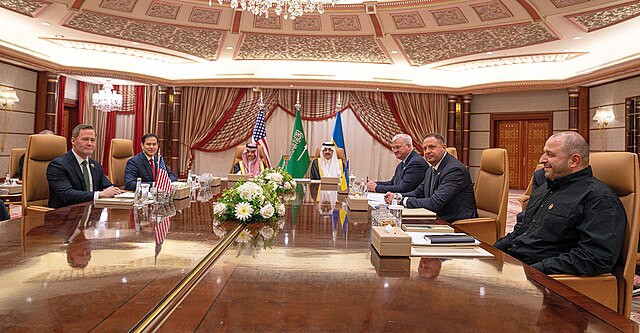Ukraine agreed Tuesday to a U.S.-brokered proposal for an immediate 30-day ceasefire with Russia, a potentially significant diplomatic breakthrough after nearly three years of war, contingent upon Moscow's acceptance. The agreement was reached during eight hours of high-level talks in the Saudi city of Jeddah, where U.S. Secretary of State Marco Rubio led the American delegation.
"The ball is now in [Russia's] court," Rubio said at a press briefing after the negotiations concluded. "We'll take this offer now to the Russians. And we hope that they'll say yes, that they'll say yes to peace."
As part of the deal, the Trump administration pledged to immediately resume sharing intelligence and sending military aid to Kyiv, reversing its controversial decision 10 days earlier to freeze support. Approximately $1 billion in military equipment, previously authorized by the Biden administration but withheld after President Trump's recent policy shift, will now be delivered.
In a joint statement released by the State Department, the U.S. and Ukraine outlined their position clearly: "Ukraine expressed readiness to accept the U.S. proposal to enact an immediate, interim 30-day ceasefire, which can be extended by mutual agreement of the parties, and which is subject to acceptance and concurrent implementation by the Russian Federation."
Ukraine's willingness to embrace a ceasefire marks a critical step toward potential negotiations to end a conflict that has profoundly impacted global security and economic stability since Russia's 2022 invasion. Ukrainian President Volodymyr Zelenskyy was present in Saudi Arabia during the talks but did not directly participate.
Zelenskyy's Chief of Staff Andriy Yermak led Ukraine's negotiating team and emphasized Kyiv's readiness to engage diplomatically. "Ukrainians want a peace," Yermak said. He acknowledged security guarantees would be "very important," but stated clearly that the immediate priority was finding a path toward initiating peace talks.
Rubio and national security adviser Mike Waltz, who accompanied him, stressed that President Trump prioritized ending all hostilities, not just air and missile strikes. Waltz said Ukraine accepted not only the ceasefire terms but also presented detailed principles for a broader peace agreement, including security assurances necessary for lasting stability.
The U.S. commitment to reactivating support follows intense bipartisan criticism of the administration's aid freeze, which had raised alarm in European capitals and put Ukraine at a strategic disadvantage. Analysts warned the pause in assistance risked bolstering Russia's negotiating leverage at a critical juncture.
Whether Russia will reciprocate remains uncertain. Steve Witkoff, President Trump's Middle East envoy who previously engaged in lengthy discussions with Russian President Vladimir Putin, will travel to Moscow in the coming days to discuss the proposal directly.
The ceasefire development is coupled with a broader economic agenda. The joint U.S.-Ukraine statement pledged both leaders would swiftly finalize "a comprehensive agreement for developing Ukraine's critical mineral resources," a deal intended to bolster Ukraine's economy and long-term security.
President Trump previously canceled a planned signing ceremony for the mineral resources agreement last month following a contentious meeting with Zelenskyy at the White House. The resumption of talks signals a possible thaw in relations strained by recent disputes.
Trump's earlier aid freeze had sparked widespread concern, fueling speculation over U.S. commitment to Ukraine and rattling international financial markets already uneasy amid escalating geopolitical tensions. The move to restart aid was welcomed by Ukraine's European allies, who have underscored the strategic importance of continued U.S. backing.
Rubio will soon consult his G7 counterparts to coordinate next steps, while Waltz indicated imminent direct communications with his Russian counterpart. Both delegations have agreed to appoint negotiating teams immediately, aiming to craft a lasting peace framework that includes broader regional security.
"The president's objective here is, number one, above everything else, he wants the war to end," Rubio emphasized. "Today Ukraine has taken a concrete step in that regard. We hope the Russians will reciprocate."




